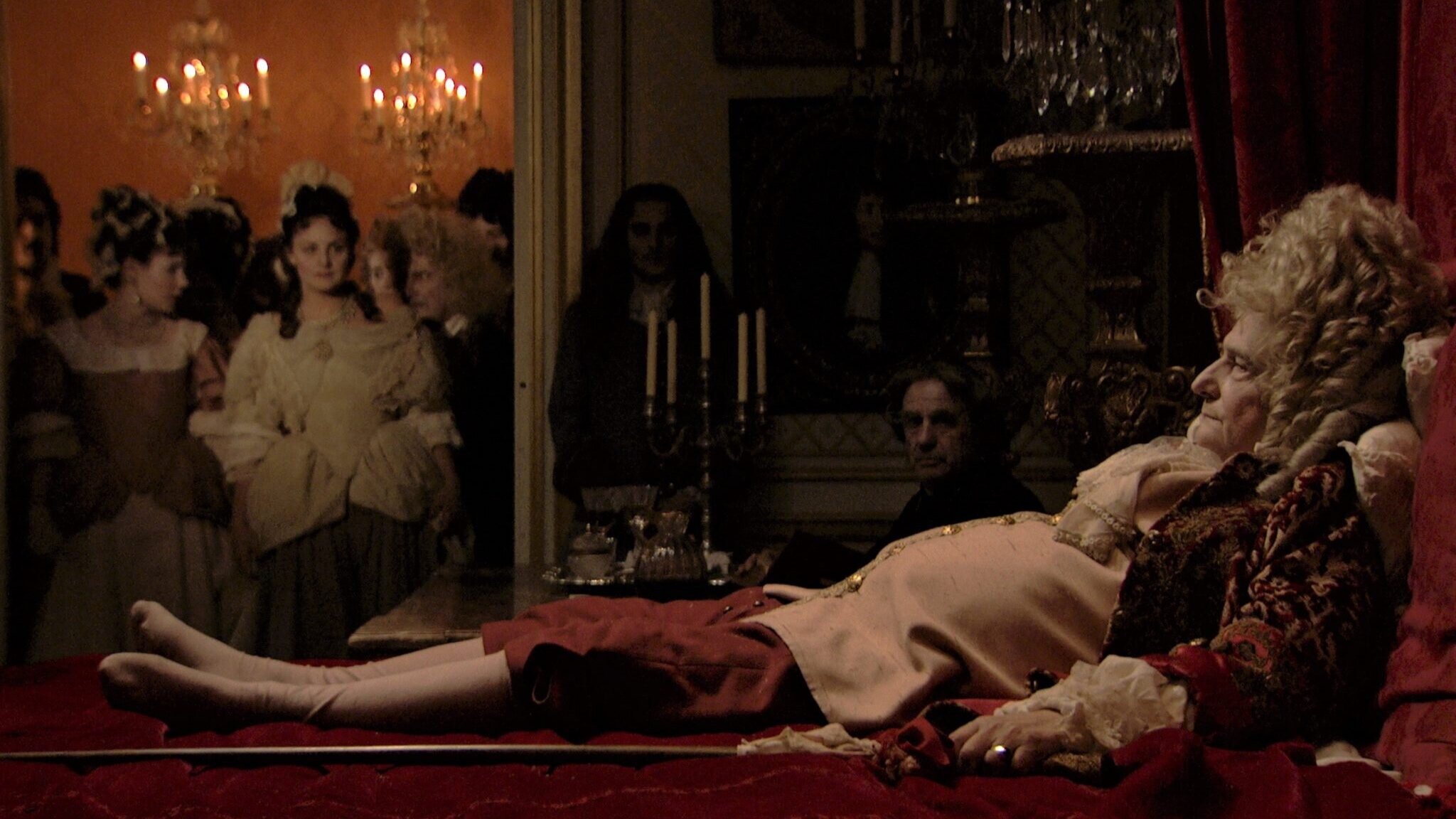The Death of Louis XIV
Exceptional but demanding, this ultimately uneven film is the work of a filmmaker unknown to us.
This extraordinary film is the latest of a series of features to be made by the Catalan director Albert Serra whose work has never been released here before. One reason for that may lie in the fact that he favours working with non-professional actors so that usually there are no big names attached that would help to sell his work. This time, however, he has in the central role one of the legendary names in French cinema, Jean-Pierre Léaud. His presence here as Louis XIV will attract attention, but that does not mean that Serra’s film makes for easy viewing.
Although initially envisaged as a work that would become a museum installation, this is a film which, despite its intimate nature as a study of a dying man set in his bedchamber, demands to be seen in the cinema. Working with Jonathan Ricquebourg as his photographer, Serra opts for the ’Scope screen and makes great play with the faces of his players while utilising the space around to suggest the world that is receding from Louis XIV now that he can rarely rise from his bed. This is a slow-moving minimalistic film, one that comes across as a work of total integrity - and that extends to the limited use of music perfectly judged. Watching this piece one thinks of Dreyer and of Bresson, although this may not be a religious film. In point of fact it is uncertainty as to what Serra is aiming at that reduces my own rating for a film which will in any case be too demanding for many viewers.
The screenplay by Thierry Lounas and Serra himself draws on two sets of memoirs of the period but, however precise the detail on screen, the very casting of Léaud alters our perceptions. The image we hold of this actor is from his debut film, Les Quatre Cents Coups of 1959, and, given that film’s fame and availability, even younger viewers will be aware of it. Consequently, when we view this study of the dying Louis it becomes a much wider reflection on aging: Léaud wears giant wigs for the part and may have been made up, but, whatever his own state of health, the face of the actor as a septuagenarian makes us recall his youthful appearance from 1959. His performance here is a very fine one that illustrates his ability just to be in front of the camera rather than making us aware of somebody acting well, but even so we feel that we are watching Louis and Léaud simultaneously.
This means that, regardless of its precise period setting, Serra’s film seems to be about all of us - Louis, Léaud, the viewer - and the way in which we may all come to suffer on our deathbeds. If this had been a Bresson film, it would doubtless have ended with music that was transcendental, seeking to persuade us - successfully or not - that, despite the human pain and suffering, God’s salvation awaits us. Here, as in Bresson’s A Man Escaped, the music of Mozart features. However, the relatively substantial extract that we hear from his C minor Mass comes not at the end but only towards the end when the king’s final decline and death are still ahead. It sounds like a flourish but occurs too soon to carry that message. Instead the death is followed by an autopsy and the last word is not ‘Amen’ but a comment from a doctor: belonging to an age in which medicine still vies with supposed magic remedies, he declares: “We’ll do better next time”. But that cuts across the wider subject of death and whether or not it is indeed the end. At this late stage with the film slowing up even more its possible meaning becomes ever more enigmatic. But, successful or not in the fullest sense, this is a work of art.
MANSEL STIMPSON
Cast: Jean-Pierre Léaud, Patrick d'Assumçao, Marc Susini, Jacques Henric, Bernard Belin, Irène Silvagai, Vicenç Altaló, Alain Lajoinie.
Dir Albert Serra, Pro Thierry Lounas, Screenplay Thierry Lounas and Albert Serra, Ph Jonathan Ricquebourg, Art DirSebastián Vogler, Ed Ariadna Ribas, Artur Tort and Albert Serra, Music Marc Verdaguer, Key Costumes Nina Avramovic.
Capricci/Rosa Filmes/Andergraun Films/Bobi Lux/Ciné +-New Wave.
116 mins. France/Portugal/Spain. 2016. Rel: 14 July 2017. Cert. 12A.


